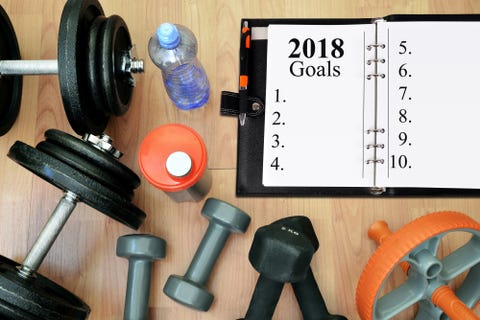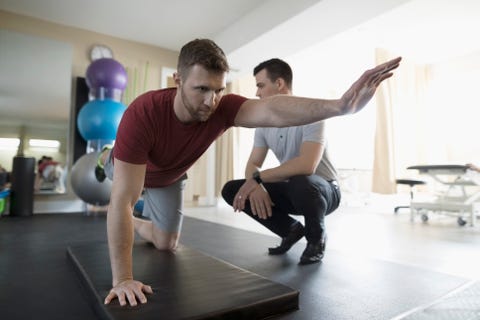
If you want to get fit but you don’t know how, that’s no cause for shame or despair. No one is an expert in every field — so instead of puttering aimlessly around the gym, you should turn to someone whose sole focus is helping people to transform into their best selves.
There’s tons of information available online and programs designed by professionals to help you to get in shape, but it can be worth it to take a more personalized approach. If you can afford it, hiring a personal trainer is an excellent option, particularly if you struggle with keeping yourself motivated. You’re less likely to bail on your workout when someone (or something — in this case, your wallet) holds you accountable, and a trainer can give you that extra push out the door when you’re trying to decide whether or not to do your morning workout.
But how can you find a good trainer? And if you’ve already hired someone to design your training plan, how can you be sure you’re working with the right one? Even if a trainer has credentials up the wazoo, it doesn’t necessarily mean he or she is the best option for you and your goals.
When it comes down to it, you’re putting in the time, money, and effort for your new and improved body, so you better make it worth your while. Here are eight things you need to keep in mind before hiring a personal trainer.
Outline your goals

Getty Imagesvencavolrab
The first step in your newly-focused fitness journey should be establishing exactly what you’re trying to accomplish. Do you have definite targets for your training, or do you simply have a nebulous aim to “get fit”?
Having broad goals is OK, but you shouldn’t make a major financial and personal decision like hiring a coach if you don’t have a few well-defined objectives for your training plan. Start with something simple, like a target body weight or race time, or even a goal as basic as working up to the ability to perform 10 pullups. Make sure the objectives are things you truly care about.
The best trainers listen to what the client is trying to accomplish.
Once you start talking to potential candidates, you can streamline your goals and even come up with new ones with their help and expertise. But if you start without any idea of what you’re trying to accomplish, you’ll be more likely to fall in with a trainer who won’t push you to your full potential.
Take your budget into account
As with most things in life, a personal trainer will cost you. Prices may vary based on geographic location, gym affiliation (some trainers are affiliated with a gym, while others have an independent practice), and more. But a trainer can have a hefty price tag, especially if the trainer has higher education or a large Instagram following.
“I’d say a normal high quality experience trainer can charge between $125 and $200 per session. There are certainly those who can command much higher fees, but those are based on demand and a long track record of proven results,” Jeff Cavaliere MSPT, CSCS, former Head Physical Therapist/Strength Coach with the New York Mets and Men’s Health advisor, told MensHealth.com.
Before burning a hole in your wallet, decide the absolute top dollar amount you can afford or are willing to pay. Once you find a potential trainer, discuss the possibility of a discount. Perhaps there’s a deal for getting a package and paying up front, or maybe you can even split the session and cost with a friend.
Don’t be fooled by a big name (or a big follower count)

Getty ImagesWestend61
In the age of celebrity or Instagram-famous personal trainers, it’s important to know that a big name doesn’t tell you a whole lot. While some high-profile trainers may have credentials, others might not.
“Celebrity trainers aren’t necessarily good trainers. They could just be in the right area at the right time,”said Cavaliere.
Keep in mind that celebrity trainers are only worth the investment if they have safely generated results for their clients and are still being hired by other celebrities. So if someone lists a celebrity client on their website, that doesn’t necessarily mean much by itself.
Similarly, a high follower count on social media doesn’t guarantee that they actually know what they’re doing with clients. They might just be a pretty face or a flashy set of abs — selfies and brand sponsorships are not personal training credentials.
Ask them about their credentials
On that note: Technically, literally anyone can advertise themselves as a personal trainer. That’s why it’s important to find someone with real credentials — which come in the form of letters at the end of their name.
You’re forgiven if those just look like alphabet soup to you now, but you need to learn up before making hiring someone.
“If you don’t know what the letters mean, ask… and then look it up,”Cavaliere advised. “If they come from graduate degrees in related health/science fields from accredited universities, even better.”
So how do you know you’re in good hands? You’ll want to be sure your trainer attended an organization that is accredited by the National Commission for Certifying Agencies (NCCA), which is nationally recognized as being a reliable predictor of sports medicine and exercise knowledge. “The gold standard in the industry is the National Strength and Conditioning Association (NSCA). The NSCA-CSCS (Certified Strength and Conditioning Specialist) or NSCA-CPT (Certified Personal Trainer) certifications are the two to look for,” said Cavaliere.
Other certifications worth having: NASM-CPT (National American Sports Medicine) ACSM-CPT (American College of Sports Medicine), or ACE-CPT (American Council on Exercise) all indicate some level of credibility.
Identify their area of expertise
Every personal trainer has their own focus. Some trainers work with those struggling with joint pain, while others might work solely with elderly clients building bone density and improving balance. It’s important to find a program that works best for you. If a trainer’s programming is built around HIIT workouts that leave you drenched in sweat and out of breath, that type of warrior-style mentality won’t cut it if you love doing yoga, or if you struggle with chronic knee pain.
“There is definitely more than one way to program workouts for fat loss, muscle growth, etc. So find the one that meshes best with your style and go with that. There’s nothing worse than hating everything you’re doing in a workout,” according to Cavaliere.
If you’re still unsure, ask the trainer for what they typically include in a program and ask about their other clientele. If your trainer works mostly with bodybuilders, you’ll know their style is geared towards building bigger muscles and strength. So if you’re looking to work on leaning out (rather than bulking up), maybe you should hire someone else.
See if their personality is compatible with yours
“Trainers can differ in their method of motivation (some are more prone to screaming, while others can be steely-eyed but encouraging), or their methods of getting the job done,” Cavaliere said.
If the trainer seems rigid and uncompromising, and you’re more of a laid-back type, it’s probably not going to be a good fit. If your personality doesn’t mesh with that of your trainer, that’s a problem.
Conversely, it’s also a problem if you get along too well. If you’re too busy chatting during workouts to get in another set of deadlifts, it’s going to interfere with the rate of your progress. While you want a trainer who is encouraging and fun to be around (you don’t want to spend all that time with a drill-sergeant-type you can’t stand, right?), you need to make sure you’re still being pushed to your limits and are achieving your goals.
Ask them questions — but listen to what questions they ask you

Getty ImagesHero Images
Make sure your trainer checks in with you before trying to put you on a program. That means asking questions about your diet and previous fitness routine beyond your current weight.
The trainer should also ask you if you are on any medications, as some, like certain asthma medications, can influence your heart rate. If you’re asked to do 10 burpees in 20 seconds, you could be causing undue strain on your heart, so this is really important for them to know.
A good trainer will also inquire about your history of injuries (recent or chronic). “I’d evaluate every major joint (ankles, knees, hips, lower back, thoracic spine, shoulders, elbows, wrists) to see if I could uncover reasons for the injury or potential weak links in the kinetic chain that will cause future breakdown,” Cavaliere explained.
“I’d also ask about any current training regimens. What have they been doing most recently and at what consistency level?” he said. This can help to identify a client’s goals (which we’ve already established is a major factor in picking a trainer) and motivation level.
Ask yourself if you’re making progress
If you’ve been training for a while but you’re not seeing tangible results, it’s OK to move on and find someone new — especially if you wind up with a bad trainer. Sometimes it’s just not the right match, but it might take a few months to see that. Give it a good four to six weeks, Cavaliere advised, at which point you should start seeing some definite results.
“The best trainers listen to what the client is trying to accomplish and provide them with the shortest, most direct path for getting there,” Cavaliere said. “Great trainers do not create clients that are dependent on them for their fitness, but rather choose to use them simply because they feel they get more out of them than they can do on their own.”
If your trainer doesn’t check those boxes for you, it’s OK to kick them to the curb.
Source: Read Full Article
